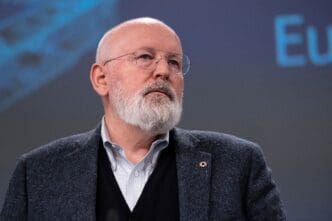Executive Summary
The Story So Far
Why This Matters
Who Thinks What?
Frans Timmermans has resigned as the leader of the GreenLeft-Labor alliance following a significant underperformance in the Dutch general election, where the party lost five seats and finished in fourth place. His departure on Wednesday night came as his extensive legacy in European Union politics and a perception of elitism ultimately undermined his campaign to lead the Netherlands.
Political Setback in the Netherlands
In a speech delivered in Rotterdam after the exit polls were published, Timmermans acknowledged his inability to convince voters, stating, “It’s clear that I, for whatever reason, couldn’t convince people to vote for us.” He announced his decision to step back and transfer leadership to the next generation.
Timmermans’ bid to become the Dutch prime minister was closely watched by the pan-European Party of European Socialists, who viewed him as a symbol of potential resurgence for progressive politics. They saw him as an international statesman with a genuine chance to lead a government, a feat not achieved by Social Democrats in the Netherlands for 23 years.
The Brussels Factor
For nearly a decade, Timmermans served as a European Commissioner, spending half that time as Commission President Ursula von der Leyen’s second-in-command. During this tenure, he was instrumental in developing the EU Green Deal package, a flagship initiative to combat climate change.
However, this prominent international experience proved to be a liability in Dutch domestic politics. Voters often perceived him as an outsider and an elitist, unable to shed his reputation as a “stodgy statesman” in The Hague. Campaign expert Alex Klusman and Leiden University politics professor Sarah de Lange noted that Timmermans was seen as an intellectual focused on foreign affairs, lecturing Dutch citizens from an external perspective.
Right-wing party leaders intensified this narrative, with Dilan Yeşilgöz, leader of the liberal People’s Party for Freedom and Democracy (VVD), repeatedly labeling him “arrogant” and “elitist.” Timmermans was frequently branded as a “green fanatic” who would mismanage taxpayer funds if given the opportunity to govern.
A Failed Image Overhaul
Timmermans made considerable efforts to alter his public image. He actively campaigned across the country, sought to project a more energetic and healthier persona, and emphasized his connection to his hometown of Maastricht. This makeover included a gastric bypass surgery a year prior, which he discussed openly in an attempt to appeal to a broader, particularly right-wing, electorate.
He also focused on the social dimensions of climate change, advocating that renewable energy development would lead to reduced energy bills for Dutch households. Additionally, his two years as an opposition leader after the 2023 election were described as “humbleness lessons,” where he reportedly became more receptive and less dogmatic.
Despite these concerted efforts, personal opinion ratings just days before the election indicated that the wider Dutch population still held unfavorable views of Timmermans. According to Professor de Lange, he was “clearly not perceived as a new Timmermans” but rather as the same figure from 2023, known for his ministerial and commission credentials but less so as a political fighter.
Key Takeaways
Timmermans’ resignation underscores the persistent challenge for EU political figures transitioning back to national politics. His deep involvement in the EU’s Green Deal and his perceived cosmopolitan image ultimately alienated a significant portion of the Dutch electorate, contributing to his party’s disappointing performance and his decision to step down.








